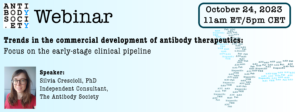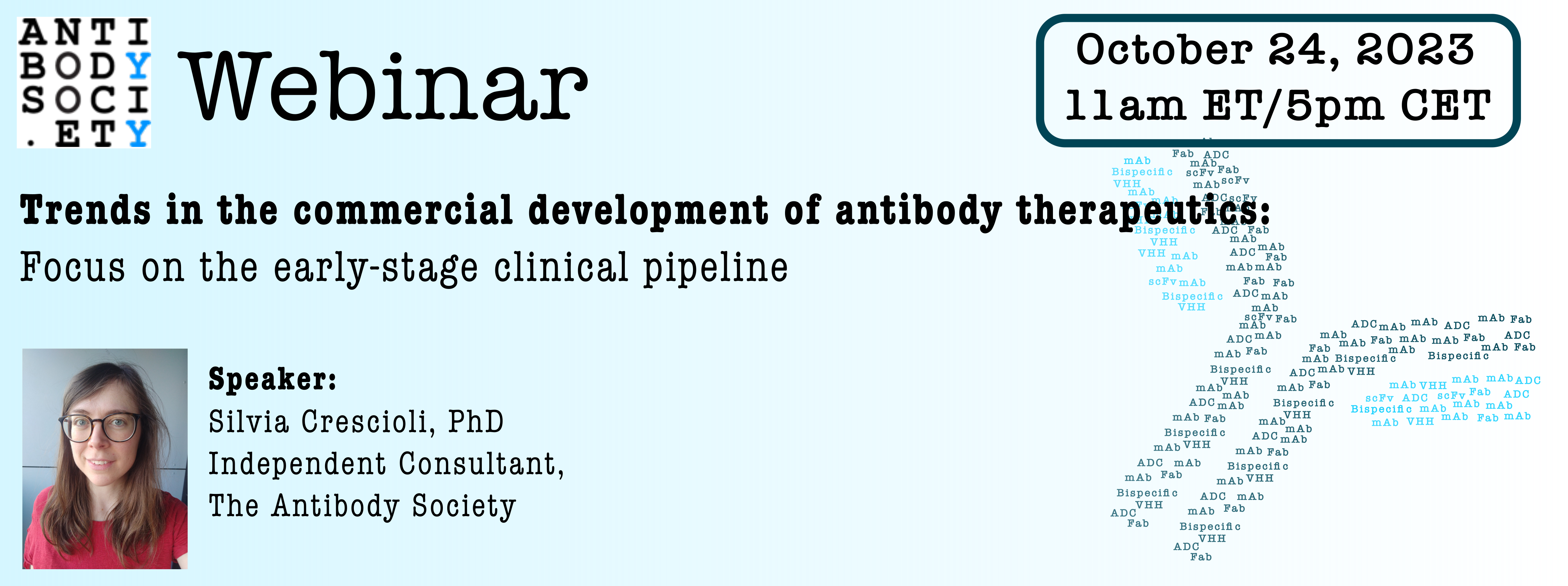Antibody Engineering & Therapeutics commences on Thursday, December 14, 2023! Visit us at Booth #113 for a free T shirt and networking.
And don’t miss the keynote address by Dr. Heather Bax, the 2023 Huston Award recipient.
the official website of the antibody society
Antibody Engineering & Therapeutics commences on Thursday, December 14, 2023! Visit us at Booth #113 for a free T shirt and networking.
And don’t miss the keynote address by Dr. Heather Bax, the 2023 Huston Award recipient.

Need insights into the early-stage antibody therapeutics pipeline? We’ve got you covered! Join us Tuesday Oct 24th for an in-depth analysis of the early-stage pipeline stratified by cancer and non-cancer indications, revealing trends in the molecular formats, targets, and mechanism of action.
Abstract: Since 2014, the number of antibody therapeutics entering clinical development annually has increased steadily, from 71 in 2014 to 286 in 2022. This has resulted in a clinical pipeline currently composed of ~1250 molecules, of which ~1100 and ~150 molecules are in early- and late-stage development, respectively. Despite the great interest in trends in early-stage clinical development, due to the difference in scale and difficulty in tracking molecules newly entered in clinical studies, analyses of trends in the global commercial development of antibody therapeutics are often limited to the late-stage clinical pipeline only. Luckily, The Antibody Society meticulously collects data for antibody therapeutics at all stages of clinical development. This webinar will provide an exhaustive analysis of the early-stage pipeline stratified by cancer and non-cancer indications, revealing trends in the molecular formats, targets, and mechanism of action.

 On August 18, 2023, the US Food and Drug Administration (FDA) approved Veopoz (pozelimab-bbfg) injection for the treatment of adult and pediatric patients 1 year of age and older with CD55-deficient protein-losing enteropathy (PLE), also known as CHAPLE disease. Pozelimab (REGN3918) is a human IgG4k antibody targeting complement component 5 (C5) developed by Regeneron. Veopoz received fast track, orphan drug, and rare pediatric disease designations.
On August 18, 2023, the US Food and Drug Administration (FDA) approved Veopoz (pozelimab-bbfg) injection for the treatment of adult and pediatric patients 1 year of age and older with CD55-deficient protein-losing enteropathy (PLE), also known as CHAPLE disease. Pozelimab (REGN3918) is a human IgG4k antibody targeting complement component 5 (C5) developed by Regeneron. Veopoz received fast track, orphan drug, and rare pediatric disease designations.
Veopoz is the first FDA-approved treatment for CHAPLE disease. An initial dose of 30 m/kg Veopoz is administered intravenously (IV), followed by weekly injections of 10 m/kg given subcutaneously by a health care provider. See the prescribing information for details
The efficacy and safety study of pozelimab in patients with CHAPLE were evaluated in an open-label, single arm Phase 2/3 study (NCT04209634). The study included 10 patients from 3 to 19 years of age with a clinical diagnosis of CD55-deficient PLE disease who received a single loading IV dose on Day 1, then fixed SC doses based on body weight every week over the treatment period. The primary outcome measure of the study was the proportion of patients with active disease at baseline achieving both normalization of serum albumin and clinical outcome improvement. All 10 patients achieved a serum albumin concentration of at least 3.5 g/dL by week 12, which was maintained through at least 72 weeks. All 10 patients also demonstrated a reduction in the number of hospitalizations and number of albumin transfusions over the first 48 weeks of treatment as compared to the 48 weeks prior to treatment.
Interested in data for other antibody therapeutics that have received marketing authorizations? Go to our searchable table of approved antibody therapeutics and those in regulatory review for more information.
 mAbs is the official journal of The Antibody Society. Each year, the journal’s publisher, Taylor & Francis, provides several article publishing charge (APC) waivers, with a value of up to $4000 USD / £3200 / €3840 / $5570 AUD each, that we may distribute to members. To be considered for an APC waiver, please submit pre-submission inquiries, which should include the authors, title, abstract, and general outline of the intended article, to membership@antibodysociety.org.
mAbs is the official journal of The Antibody Society. Each year, the journal’s publisher, Taylor & Francis, provides several article publishing charge (APC) waivers, with a value of up to $4000 USD / £3200 / €3840 / $5570 AUD each, that we may distribute to members. To be considered for an APC waiver, please submit pre-submission inquiries, which should include the authors, title, abstract, and general outline of the intended article, to membership@antibodysociety.org.
mAbs publishes high quality reports, reviews, and perspective articles covering a range of antibody R&D topics, including:
The selected recipients will be notified as soon as possible after the request submission deadline.
Please contact Janice Reichert (janice.reichert@antibodysociety.org) if you have questions.
Further information:
mAbs is a multidisciplinary, open access journal dedicated to the art and science of antibody research and development. The journal has a strong scientific and medical focus but serves a broad readership, including specialists in technology transfer, legal issues, investment, and the regulation of therapeutics.
The journal’s 2021 Impact Factor is 6.440 and, in total, articles are downloaded at a rate of over 1 million per year.
Members of The Antibody Society receive a 10% discount on article publication charges using their member code.
 On May 19, 2023, the US Food and Drug Administration approved EPKINLY™ (epcoritamab-bysp) for the treatment of adult patients with relapsed or refractory (R/R) diffuse large B-cell lymphoma (DLBCL), not otherwise specified, including DLBCL arising from indolent lymphoma, and high-grade B‑cell lymphoma, after two or more lines of systemic therapy. Created using Genmab’s DuoBody® technology, epcoritamab (GEN3013, DuoBody®-CD3xCD20) is a T cell-engaging bispecific IgG1k/l antibody targeting CD20 and CD3 that is jointly owned by Genmab and AbbVie. EPKINLY was approved under FDA’s accelerated approval program based on response rate and durability of response. Continued approval for this indication is contingent upon verification and description of clinical benefit in a confirmatory trial(s).
On May 19, 2023, the US Food and Drug Administration approved EPKINLY™ (epcoritamab-bysp) for the treatment of adult patients with relapsed or refractory (R/R) diffuse large B-cell lymphoma (DLBCL), not otherwise specified, including DLBCL arising from indolent lymphoma, and high-grade B‑cell lymphoma, after two or more lines of systemic therapy. Created using Genmab’s DuoBody® technology, epcoritamab (GEN3013, DuoBody®-CD3xCD20) is a T cell-engaging bispecific IgG1k/l antibody targeting CD20 and CD3 that is jointly owned by Genmab and AbbVie. EPKINLY was approved under FDA’s accelerated approval program based on response rate and durability of response. Continued approval for this indication is contingent upon verification and description of clinical benefit in a confirmatory trial(s).
FDA’s approval was supported by data from the pivotal Phase 1/2 EPCORE NHL-1 trial (NCT03625037) studying epcoritamab in 157 patients with relapsed or refractory large B-cell lymphoma who had received at least two prior systemic therapies, including some who had received prior treatments with CAR-T cell therapy. The dose escalation findings from the Phase 1 part identified a dose of 48 mg as the recommended Phase 2 dose. In the Phase 2 part, patients received 48 mg of epcoritamab as 1 ml subcutaneous injections in 28-day cycles, with weekly dosing in Cycles 1-2, dosing every second week in Cycles 3-6, and dosing every 4 weeks from Cycle 7 onward. An overall response (complete or partial response) was seen in 61% (90/148 [95 percent confidence interval (CI): 52.5-68.7]) of patients and 38% (56/148 [95 percent CI: 30.0-46.2]) achieved complete remission. The median duration of response was 15.6 months (95 percent CI: 9.7-Not reached).
Epcoritamab is being investigated in multiple ongoing clinical studies across different settings and histologies. The most advanced of these is the randomized, open-label Phase 3 EPCORE™DLBCL-1 trial (NCT04628494) of epcoritamab vs investigator’s choice chemotherapy in patients with R/R DLBCL. The study is recruiting an estimated 552 patients and has an estimated primary completion date in June 2024.
Interested in data for other antibody therapeutics that have received marketing authorizations? Go to our searchable table of approved antibody therapeutics and those in regulatory review for more information.